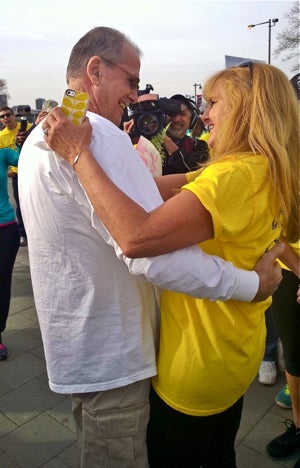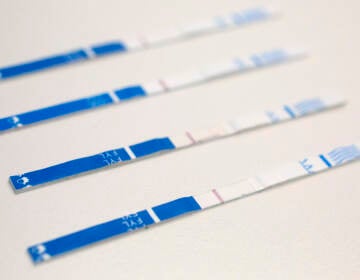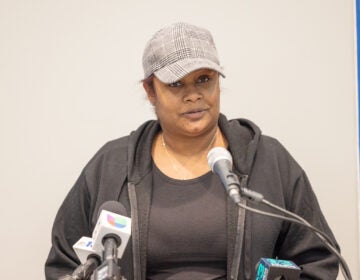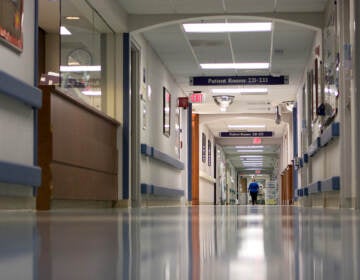Organ donations from drug overdose victims rising with opioid death toll
Inside the Gift of Life Donor Program’s headquarters in Philadelphia, a room serves as a sort of mission control for organ donation.
Listen 5:11
Gift of Life Donor Program's Transplant Information Center gets a call every time someone dies in a hospital in its service area. (Joel Wolfram for WHYY)
Inside the Gift of Life Donor Program’s headquarters in Philadelphia is a room that serves as a sort of mission control for organ donation. Three rows of desks face a huge screen that displays records of potential organ and tissue donors. Workers manning the phones get a call every time someone dies in a hospital.
“These guys are the hub of the wheel,” said Howard Nathan, Gift of Life’s president and CEO. “They get the referral from the donor hospital, they separate the patients who are potential organ donors, and notify our coordinator on call. We have 15 people on call per day in three states that go out to the hospital.”
Gift of Life is the federally designated organ procurement organization in a territory that covers 11.2 million people in Eastern Pennsylvania, South Jersey, and Delaware. It receives 38,000 calls per year, which are increasingly reporting deaths from drug overdoses, Nathan said.
“Ten years ago, only about 4 percent of organ donors were from drug overdose,” he said. “In 2017, it’s 27 percent of our organ donors.”
Epidemic amplifies ranks of donors
The epidemic of opioid overdose continues to claim more lives, with officials estimating that the number of deaths increased by 300 last year in Philadelphia alone. But many whose lives are cut short by drug overdoses are helping extend other lives as organ donors. They’re making up a larger share than ever of those who make a lifesaving gift after death.
A total of 154 drug overdose victims within Gift of Life’s territory became organ donors last year. Nationally, the number has more than doubled in the last three years to about 1,400.
Organ donation is only possible when the cause of death destroys brain function but leaves the body’s organs intact and on life support. That’s often the case in drug overdose patients who are resuscitated after a long period of time without breathing.
“A lot of the deaths are in young, otherwise healthy people whose bodies and organs can withstand that time when they’re not breathing and their heart’s not beating,” said David Goldberg, a professor of medicine and a transplant doctor at the University of Pennsylvania.
Recent drug overdose donors in Gift of Life’s region were, on average, 32 when they died. Their youth makes them good candidates for organ donation, and Goldberg said opioid drugs themselves don’t do damage to organs. But donations from many drug users carry some increased risks.
“There’s this concern of an increased risk of transmission of hepatitis B, hepatitis C, and HIV,” Goldberg said. “Those risks are still very small, but they’re increased from baseline.”
About 25 to 30 percent of overdose donors test positive for hepatitis C, he said. Even when they test negative, federal guidelines put organs from people with a recent history of injecting drugs in a category of “increased risk” for disease. But improved techniques for detection have reduced the risk to the point that, for many patients, it’s more likely they’d die waiting for the next organ. Even with the increase in donations from overdose victims, Gift of Life says about 20 people die every day in the United States waiting for a transplant.
Goldberg said there haven’t been any cases of HIV transmission from organ transplant since universal testing was adopted in 2014. He added that today’s more effective treatments for hepatitis C considerably lower the stakes of contracting the infection.
Rejection, connections
Still, some patients are reluctant to receive organs with the increased-risk label. Tom Burke of Folsom, Pennsylvania, needed a transplant in 2013 to cure his liver cancer.
“The first liver they offered me, I really didn’t want it because the person was a drug addict, and he did all kinds of crazy other things,” Burke said.
The potential donor also had a reported history of high-risk sexual relationships. But within a month, Burke’s doctor brought him into the hospital to give him a liver from another donor.
“He says, ‘Do you want to see your liver?’ At the time, I didn’t know that Cody’s liver was right next door to me,” Burke recalled.
The donor was Cody Souders, an 18-year-old from Easton, Pennsylvania, who had died in his home from an overdose of prescription painkillers. Cody’s mom, Amy Souders, said he had elected to be an organ donor on his driver’s license and that the family wanted to donate as much of Cody’s body as possible, “so that his death wouldn’t be in vain.”
“To be perfectly honest, the organ donation is really the only silver lining that we have in the whole situation,” Souders said.
Cody Souders made organ and tissue donations that went to more than 50 people, said his mother. Thousands of organ donors who were killed by opioid addiction have made donations like these possible. Gift of Life’s Howard Nathan recognizes that the boon for organ donation comes out of tragedy.
“Our job is to take the situation we have in front of us, and try to turn it into an opportunity for new life for that donor and that donor family,” Nathan said.

Tom Burke is now 70 years old, and met the Souders family a few years after his transplant surgery at the Gift of Life Donor Dash, an annual fundraising run in Philadelphia that supports organ donation.
“Every one of them hugged me and wouldn’t let me go,” Burke said. “And they just were holding my side where my liver transplant — where Cody was.”
Souders said they’ve gotten together for a reunion at the Donor Dash every year since.
“All his children, his grandchildren, his wife,” Souders said, “they’ve all become part of our family.”
Information on registering as an organ donor is available on the Gift of Life Donor Program’s website: http://www.donors1.org/registry/
WHYY is your source for fact-based, in-depth journalism and information. As a nonprofit organization, we rely on financial support from readers like you. Please give today.





